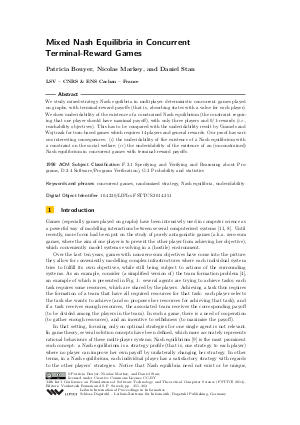Mixed Nash Equilibria in Concurrent Terminal-Reward Games
Authors Patricia Bouyer, Nicolas Markey, Daniel Stan
-
Part of:
Volume:
34th International Conference on Foundation of Software Technology and Theoretical Computer Science (FSTTCS 2014)
Part of: Series: Leibniz International Proceedings in Informatics (LIPIcs)
Part of: Conference: IARCS Annual Conference on Foundations of Software Technology and Theoretical Computer Science (FSTTCS) - License:
 Creative Commons Attribution 3.0 Unported license
Creative Commons Attribution 3.0 Unported license
- Publication Date: 2014-12-12
File

PDF
LIPIcs.FSTTCS.2014.351.pdf
- Filesize: 471 kB
- 13 pages
Document Identifiers
Subject Classification
Keywords
- concurrent games
- randomized strategy
- Nash equilibria
- undecidability
Metrics
- Access Statistics
-
Total Accesses (updated on a weekly basis)
0PDF Downloads0Metadata Views
Abstract
We study mixed-strategy Nash equilibria in multiplayer deterministic concurrent games played on graphs, with terminal-reward payoffs (that is, absorbing states with a value for each player). We show undecidability of the existence of a constrained Nash equilibrium (the constraint requiring that one player should have maximal payoff), with only three players and 0/1-rewards (i.e., reachability objectives). This has to be compared with the undecidability result by Ummels and Wojtczak for turn-based games which requires 14 players and general rewards. Our proof has various interesting consequences: (i) the undecidability of the existence of a Nash equilibrium with a constraint on the social welfare; (ii) the undecidability of the existence of an (unconstrained) Nash equilibrium in concurrent games with terminal-reward payoffs.
Cite As Get BibTex
Patricia Bouyer, Nicolas Markey, and Daniel Stan. Mixed Nash Equilibria in Concurrent Terminal-Reward Games. In 34th International Conference on Foundation of Software Technology and Theoretical Computer Science (FSTTCS 2014). Leibniz International Proceedings in Informatics (LIPIcs), Volume 29, pp. 351-363, Schloss Dagstuhl – Leibniz-Zentrum für Informatik (2014)
https://doi.org/10.4230/LIPIcs.FSTTCS.2014.351
BibTex
@InProceedings{bouyer_et_al:LIPIcs.FSTTCS.2014.351,
author = {Bouyer, Patricia and Markey, Nicolas and Stan, Daniel},
title = {{Mixed Nash Equilibria in Concurrent Terminal-Reward Games}},
booktitle = {34th International Conference on Foundation of Software Technology and Theoretical Computer Science (FSTTCS 2014)},
pages = {351--363},
series = {Leibniz International Proceedings in Informatics (LIPIcs)},
ISBN = {978-3-939897-77-4},
ISSN = {1868-8969},
year = {2014},
volume = {29},
editor = {Raman, Venkatesh and Suresh, S. P.},
publisher = {Schloss Dagstuhl -- Leibniz-Zentrum f{\"u}r Informatik},
address = {Dagstuhl, Germany},
URL = {https://drops.dagstuhl.de/entities/document/10.4230/LIPIcs.FSTTCS.2014.351},
URN = {urn:nbn:de:0030-drops-48550},
doi = {10.4230/LIPIcs.FSTTCS.2014.351},
annote = {Keywords: concurrent games, randomized strategy, Nash equilibria, undecidability}
}
Author Details
References
-
Patricia Bouyer, Romain Brenguier, Nicolas Markey, and Michael Ummels. Pure Nash equilibria in concurrent games. Logical Methods in Computer Science, 2014. Submitted, under revision.

-
Patricia Bouyer, Nicolas Markey, and Daniel Stan. Mixed Nash equilibria in concurrent terminal-reward games. Research Report LSV-14-11, Laboratoire Spécification et Vérification, ENS Cachan, France, October 2014.

-
Krishnendu Chatterjee, Marcin Jurdziński, and Rupak Majumdar. On Nash equilibria in stochastic games. In CSL'04, volume 3210 of LNCS, pages 26-40. Springer, 2004.

-
Taolue Chen, Marta Kwiatkowska, David Parker, and Aistis Simaitis. Verifying team formation protocols with probabilistic model checking. In CLIMA XII, volume 6814 of LNAI, pages 190-207. Springer, 2011.

-
Vincent Conitzer and Tuomas Sandholm. Complexity results about Nash equilibria. In IJCAI'03, pages 765-771, 2003.

-
Vincent Conitzer and Tuomas Sandholm. New complexity results about Nash equilibria. Games and Economic Behavior, 63(2):621-641, 2008.

-
Luca de Alfaro, Thomas Henzinger, and Orna Kupferman. Concurrent reachability games. Theoretical Computer Science, 386(3):188-217, 2007.

-
Thomas A. Henzinger. Games in system design and verification. In TARK'05, pages 1-4, 2005.

-
John F. Nash. Equilibrium points in n-person games. Proceedings of the National Academy of Sciences of the United States of America, 36(1):48-49, 1950.

-
Piercesare Secchi and William D. Sudderth. Stay-in-a-set games. International Journal of Game Theory, 30:479-490, 2001.

-
Wolfgang Thomas. Infinite games and verification. In CAV'02, volume 2404 of LNCS, pages 58-64. Springer, 2002. Invited Tutorial.

-
Michael Ummels. The complexity of Nash equilibria in infinite multiplayer games. In FoSSaCS'08, volume 4962 of LNCS, pages 20-34. Springer, 2008.

-
Michael Ummels and Dominik Wojtczak. The complexity of Nash equilibria in limit-average games. In CONCUR'11, volume 6901 of LNCS, pages 482-496. Springer, 2011.

-
Michael Ummels and Dominik Wojtczak. The complexity of Nash equilibria in limit-average games. Technical Report abs/1109.6220, CoRR, 2011.

-
Michael Ummels and Dominik Wojtczak. The complexity of Nash equilibria in stochastic multiplayer games. Logical Methods in Computer Science, 7(3), 2011.

-
Nicolas Vieille. Equilibrium in two-person stochastic games I: A reduction. Israel Journal of Mathematics, 119:55-91, 2000.

-
Nicolas Vieille. Equilibrium in two-person stochastic games II: The case of recursive games. Israel Journal of Mathematics, 119:93-126, 2000.

